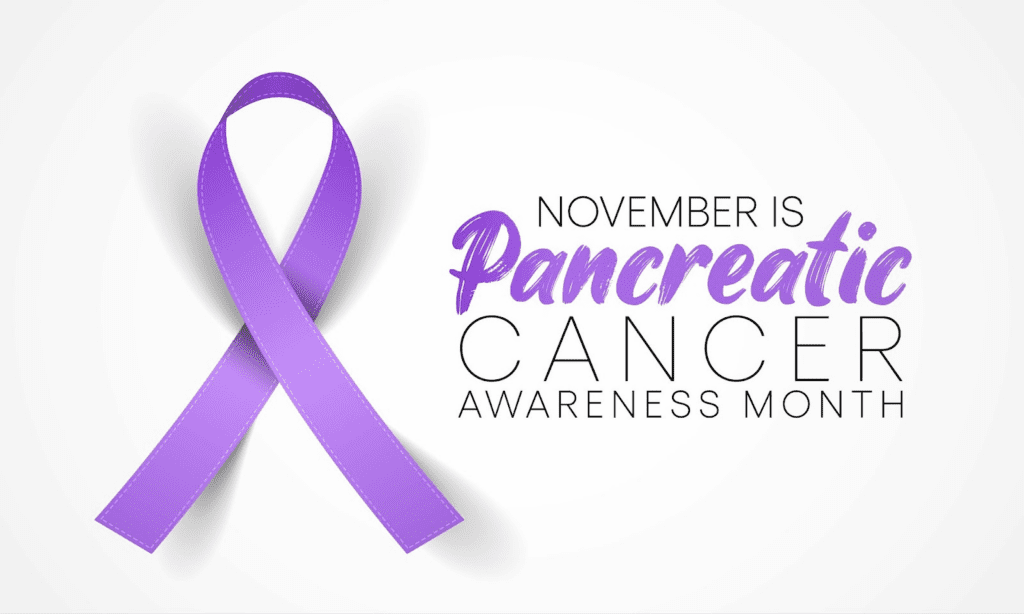Advances in Oncology and the Significance of Pancreatic Cancer Month

November is Pancreatic Cancer Awareness Month, a time to spotlight one of the most aggressive and challenging forms of cancer. With a five-year survival rate of only about 12%, pancreatic cancer is often detected too late for effective treatment. This month serves as a reminder of the importance of research, early detection, and innovative treatments in combating this devastating disease.
The Fight Against Pancreatic Cancer: Why Awareness Matters
Often referred to as a “silent killer,” pancreatic cancer typically presents symptoms like abdominal pain, jaundice, or unexplained weight loss only in advanced stages. By the time these symptoms appear, the cancer has often spread, leaving limited treatment options.
Dr. Fabiola Feldhaus, an Internal Medicine Physician with over 20 years of experience, emphasizes the role of regular healthcare checkups in early detection:
“It is very important to have your yearly preventative appointment to allow your doctor to check you according to your age and family history. This can help minimize future preventable diseases. Unfortunately, there are conditions, such as pancreatic cancer, that cannot always be predicted or prevented—especially when there is no family history. Regular appointments remain crucial for early detection.”
Public education campaigns during Pancreatic Cancer Awareness Month help spread knowledge about warning signs and the significance of timely screenings. Studies show that patients diagnosed early have a five-year survival rate of 42%. Awareness is vital to ensuring more people recognize the risks and take proactive steps.
Recent Breakthroughs in Oncology for Pancreatic Cancer
Advances in oncology provide hope in the fight against pancreatic cancer. Immunotherapy, which leverages the body’s immune system to target cancer cells, and targeted therapies that focus on specific cancer cell markers, are offering new options to patients.
Additionally, advancements in early screening methods, like blood tests for pancreatic cancer markers, are being explored. Personalized medicine, which tailors treatment plans based on a patient’s genetic profile, has also shown promise. These breakthroughs not only aim to improve survival rates but also enhance the quality of life for patients.
Dr. Feldhaus highlights steps to reduce pancreatic cancer risks:
“You can lower your risks by maintaining a healthy weight and eating a balanced diet rich in fruits, vegetables, and whole grains while limiting red and processed meats, sugary drinks, and highly processed foods. Avoid smoking, limit alcohol intake, and reduce exposure to harmful chemicals such as asbestos, pesticides, and petrochemicals.”
For individuals with a family history of pancreatic cancer, chronic pancreatitis, or precancerous lesions on the pancreas, closer follow-ups are essential.
Challenges in Treating Pancreatic Cancer
Despite progress, pancreatic cancer remains one of the most difficult cancers to treat. Its resistance to traditional treatments like chemotherapy and its aggressive nature present significant challenges. Ongoing research funding and clinical trials are critical to overcoming these barriers.
Dr. Feldhaus notes:
“Unfortunately, even if you do everything as you are supposed to, you still run the risk of developing pancreatic cancer. This is why regular appointments with primary care physicians are essential for early detection and potential cure.”
How Healthcare Staffing Supports Oncology Care
Healthcare staffing agencies like VISTA Staffing play a vital role in supporting oncology care during Pancreatic Cancer Awareness Month and beyond. As the demand for oncology specialists grows, especially in underserved or rural areas, locum tenens staffing provides a solution to fill critical gaps.
Temporary specialists help hospitals offer advanced cancer treatments, ensuring every patient has access to expert care, regardless of location.
Raising Awareness and Taking Action During Pancreatic Cancer Awareness Month
This November, we encourage everyone to get involved—whether by donating to cancer research, advocating for better healthcare policies, or spreading awareness about pancreatic cancer. Every effort counts in the fight against this disease.
At VISTA Staffing, we believe that collaboration is key to advancing cancer care. By supporting healthcare professionals and hospitals, we aim to make a difference in patients’ lives. Let’s take action this Pancreatic Cancer Awareness Month and throughout the year to raise awareness, support research, and improve health outcomes.









